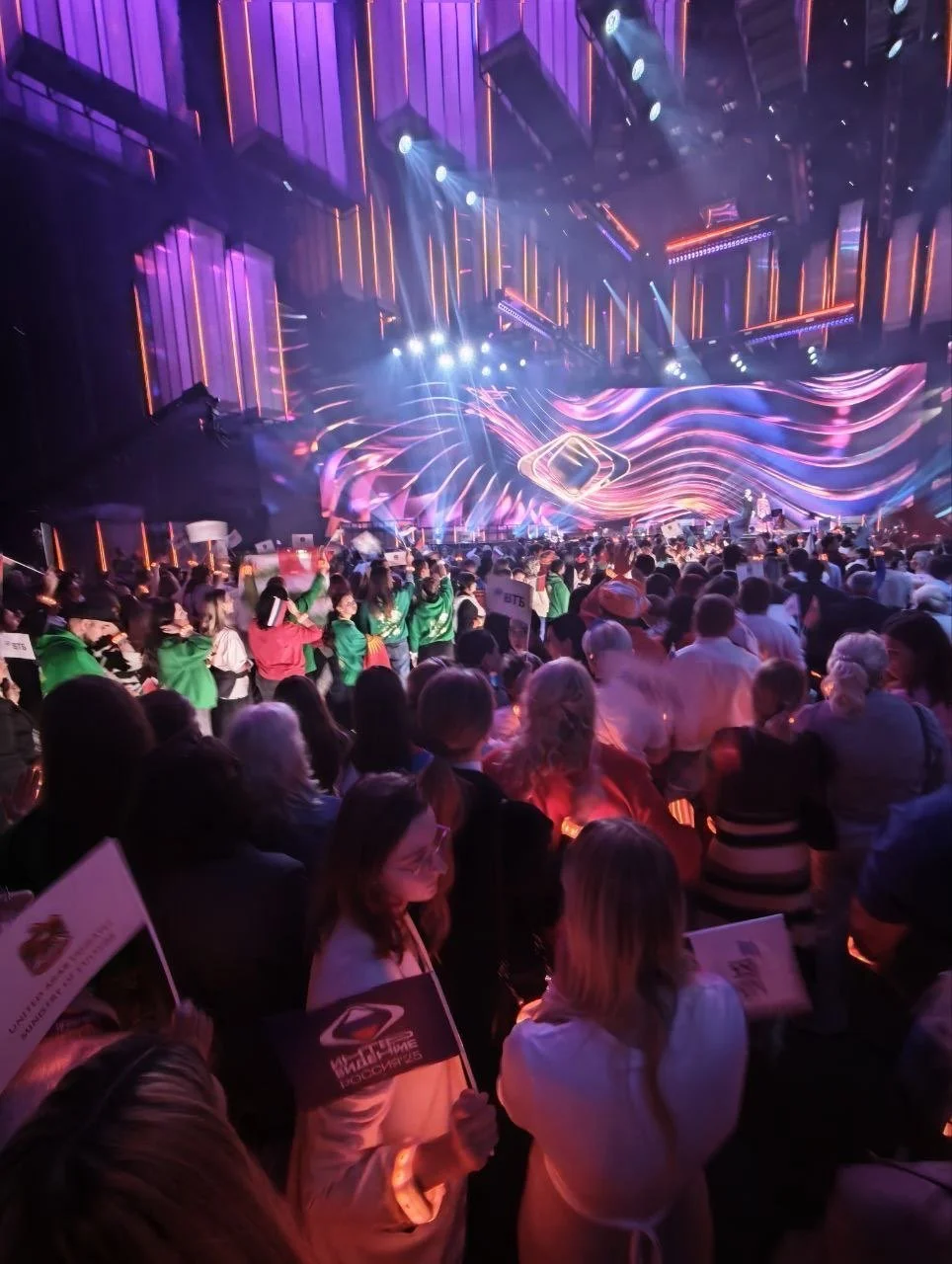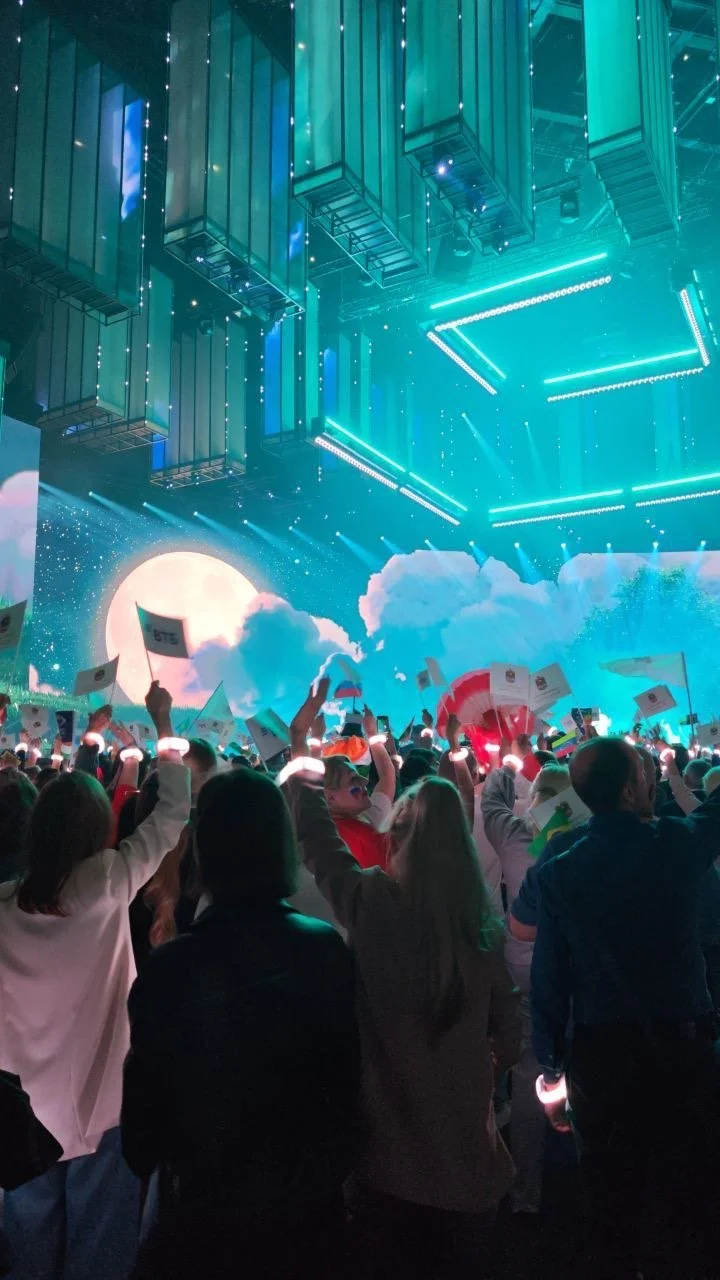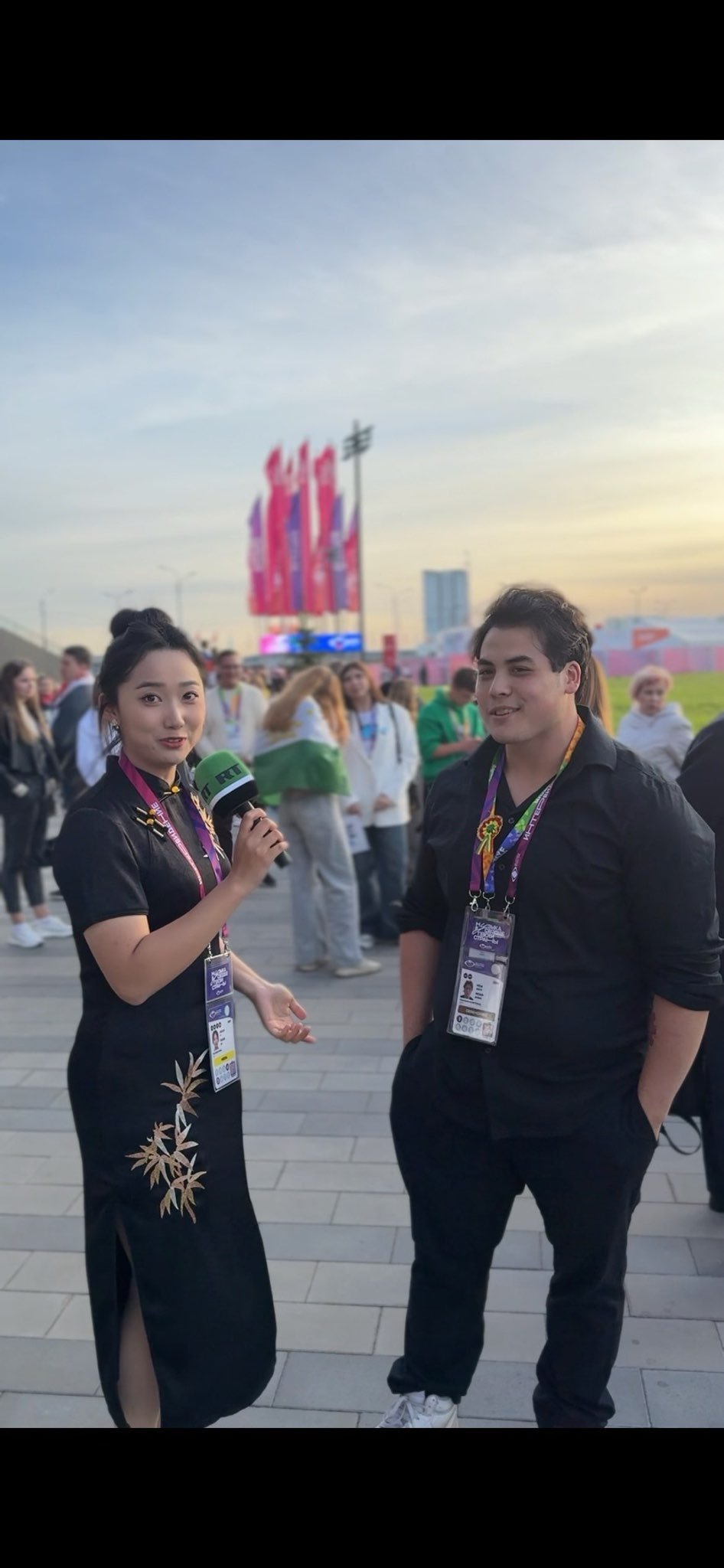Intervision: An Electric Celebration of Shared Humanity
by Noah Schenk
On September 20th in Moscow, voices from around the world rose together in song. Beneath tinted neon lights, participants from 21 countries gathered in one of Russia’s oldest cities to share their culture with the world — a spectacle of music, unity, celebration, and international solidarity. From the brass-heavy, salsa-inspired compositions of Cuba to the soulful ballads of Belarus and the sweeping, almost orchestral epicness of Vietnam’s entry, artists offered more than performances: they carried forward the deeply human traditions that continue to shape popular music in their countries.
Upon entering the concert hall, you were met with a sea of glowing wristbands and people of all ages waving the flags of the nations they supported. An atmosphere of friendship and cooperation filled the hall, and perhaps even more than the elaborately staged performances — with their pyrotechnics, stunts, and celebrity appearances — what stood out most was the welcoming spirit of the Russian people. Despite Western efforts to isolate them, what shined through was Russia’s connection to the wider world, and the respect and appreciation for other cultures on display. That spirit was embodied in the decision of the Russian participant to withdraw his own entry, declaring it unfair for the host nation to compete, and in the words of a young woman in the crowd who told me: “No matter what, Russia is the winner, because all these people from around the world came here to participate.”
Though this year marks the return of Intervision, the contest has a long and storied history. The inaugural competition was held in 1963 in Poland, conceived as an alternative to Eurovision that highlighted the voices and cultural contributions of socialist countries, particularly those of the Eastern Bloc. Intervision has always been more than a contest: it sought to inspire peace and cooperation through cultural performances and, during the Cold War, served as a bridge between the socialist countries and the West. After the fall of the Soviet Union, Intervision contests ceased, with the exception of a smaller revival in Sochi in 2008, as Russia instead turned its focus toward participation in Eurovision.
Part of what makes the return of Intervision so significant is its stance in contrast to Eurovision. While Eurovision’s largely Western-focused framework continues to shape participation, Intervision welcomed countries of diverse geopolitical positions, perspectives, and cultural traditions. From Marxist-Leninist countries like Cuba, Vietnam, Belarus, and China, to Bolivarian Venezuela, and even monarchies such as Qatar and Saudi Arabia, the contest extended a hand of friendship and humanity to participants from across the globe. Russia’s ban from Eurovision underscores how geopolitical decisions can completely override the spirit of cultural exchange, with organizers citing “human rights” concerns following the launch of the Special Military Operation. Meanwhile, Israel — geographically outside Europe — continues to participate despite ongoing human rights violations.
In my estimation, I was the only American attending the event that night. I had been invited as part of my participation in the World Youth Festival Assembly, representing the Center for Political Innovation, and it was an honor to witness the contest firsthand. Beyond the dedication of countless young volunteers, giving their time and energy out of love for their country, and beyond the seas of Russian attendees radiating warmth and friendship — a spirit found in few places in the world — what struck me most was the absence of American participants, a void created purely by political barriers. Music has long united human beings, its power to communicate predating even language. Historically, this understanding of music has been harnessed as a bridge between East and West, connecting people where diplomacy often fails. Two American participants, both of whom were also Australian citizens — Brandon Howard and Vassy — entered the competition before pressure from the Australian government forced them to withdraw. In the moment when it was announced there would be no American performer, I couldn’t help but recall the contributions of the Civil Rights leader Paul Robeson.
Robeson was not only an advocate for the rights of African Americans, but also an athlete, Hollywood actor, and globally celebrated bass singer. He used his talents and connections to help bridge the gap between the United States and the then-Soviet Union, learning the Russian language and the songs of the Russian people, and bringing them back so that American audiences could appreciate them. For this, as well as for his broader political advocacy for peace and dignity, he was dragged before the House Un-American Activities Committee. During his interrogation, he recalled:
“When I was a singer years ago… I am a bass singer, so for me it was Chaliapin, the great Russian bass, not Caruso the tenor. I learned the Russian language to sing their songs… I first went to Russia in 1934… in Russia I thought for the first time like a full human being — no color prejudice like in Mississippi, no color prejudice like in Washington. It was the first time I felt like a human being.”
For decades, there has been an effort to impede cultural exchange between Russia and the United States, because when you begin to see your enemy as a human being with dreams, ambitions, thoughts—even songs—it becomes harder to justify their demonization. That is part of what makes events like Intervision so important. Beyond the spectacle and entertainment, the contest has a deeply humanizing quality: it encourages respect, admiration, and understanding, pushing aside chauvinism and bigotry.
Even in the late hours of that night in Moscow, the achievement of Intervision was unmistakable — not only in the dazzling performances but in the statement it made about shared humanity. I was reminded once again of music’s profound ability to unify, bridging cultural and even geopolitical divides. Intervision revealed the seeds of a multipolar world emerging from respect and cooperation rather than domination and subjugation. In that hall, under neon lights and surrounded by voices from across the globe, Intervision stood as a loud, multicolored beacon of hope and optimism — a reminder that music can connect us when politics often divides us, and for that, it will be remembered.
Noah Schenk is the East Coast Regional Captain of the Center for Political Innovation, based in Boston.


